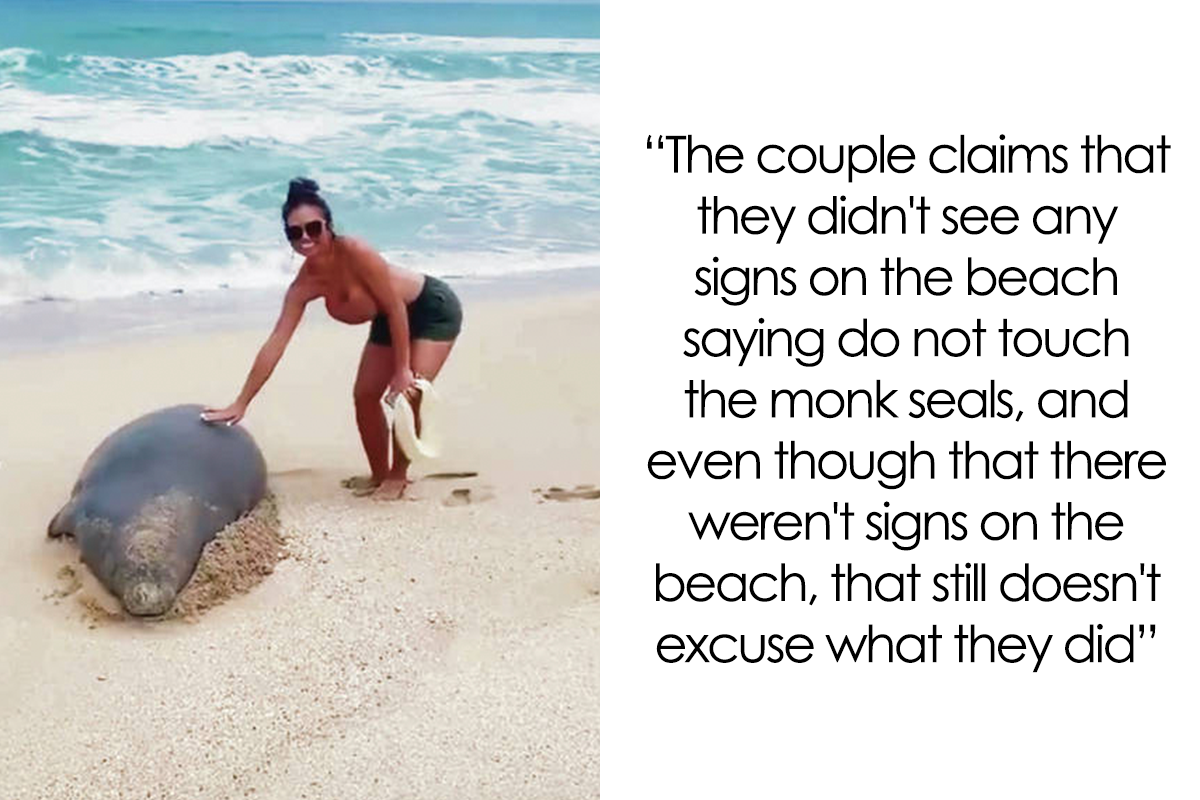
“Our Tourism Industry Produces A False Version Of Hawaiʻi”: Hawaiʻian Discourages People From Visiting Hawaiʻi If They’re Gonna Be Disrespectful There
InterviewPlanning a trip somewhere without doing some research about where you’re going is not only irresponsible, but also very dangerous, for many reasons.
For example, not knowing the customs, the culture, and the laws of your holiday destination might lead to, at the very least, upset looks from the locals and, at the very most, a fine of $50,000. And upset looks from the locals.
A Hawaiʻi native has come out with a video explaining how the latter aforementioned extreme happened and gave a fair warning to anyone visiting Hawaiʻi that if you’re not willing to show even the slightest bit of respect to the place you’re visiting, then you’re not welcome there.
More Info: TikTok
Hawaiʻi native Lily Hiʻilani Okimura shared her thoughts about a couple who got fined $500 for touching an endangered Hawaiʻi monk seal and how it’s a part of a bigger issue in Hawaiʻi tourism
Image credits: @hiililylani
So, a bit of context: back in July of last year, a couple from Louisiana was fined for getting near and even touching a Hawaiʻi monk seal on a beach in Kauai. While the fine was $500, which was still enough to ruin their honeymoon, the law states that such an offense might entail up to 5 years in prison and an up to $50,000 fine.
This in turn prompted Hawaiʻi native Lily Hiʻilani Okimura, with whom Bored Panda got in touch for an interview, to create a video detailing the issue and why this is one of the main reasons why tourists are not welcome in the tropical archipelago. But let’s rewind a bit.
So, back in July of 2021, a Louisiana couple were fined for effectively harassing a monk seal in Hawaiʻi
Image credits: @hiililylani
Image credits: @hiililylani
Image credits: @hiililylani
It is estimated that there are nearly 1,600 Hawai’ian monk seals out there, and the species has been officially deemed endangered since 1976. Hence the laws protecting the seals against people’s reckless curiosity.
Despite the laws, the signs, and, in some cases, the natives themselves asking people to not harass the Hawaiʻi wildlife, people still do, leading to a “that’s why we can’t have nice things” situation and natives effectively asking tourists to not come any more.
The couple claimed they didn’t see any signs on the matter, but they’re there, they’re big, and it is by no means an excuse to approach exotic wildlife
Image credits: @hiililylani
There’s one for green sea turtles as well
Image credits: @hiililylani
But the signs don’t really stop tourists from doing whatever the heck they want on Hawai’ian beaches
Image credits: @hiililylani
Image credits: @hiililylani
But the issue is much deeper than this, as Lily explained: “Our tourism industry produces a false version of Hawaiʻi, along with not properly educating visitors about what to do and not do when coming here. Our state government also takes lenience on the negative impacts of tourism.”
“Tourists have gotten fined before for harassing the animals. For example, the woman in my video was fined $500, which is significantly low. Harassing a monk seal can lead up to 5 years in prison and a $50,000 fine. Of course, there should also be personal responsibility to this, but our tourism industry should also do better to inform visitors about coming here with respect.”
In her video, she also elaborated by saying that the tourism industry in Hawaiʻi convinces visitors that they are “royalty,” that they can do whatever the heck they want, all the while the Kānaka Maoli, or Native Hawaiʻians, should just not do anything about it and stay silent.
Image credits: @hiililylani
But this isn’t the first time this has happened—in fact, it happens too often at this point
Image credits: Washington Post
So often that the Governor of Hawaiʻi had to speak up about the issue
Image credits: Star Advertiser
What is worse is that, once the story came out, there was a group of people outraged by this, but not in support of animal rights or the Hawaiʻi people, but outraged because they shouldn’t know the laws and that the natives should teach them.
The natives are fiercely protective of their home, and seeing folks time and time again coming and destroying homes, harassing the wildlife, and the people is, if anything, tiresome, so it should come as no surprise why natives are asking folks to stop coming to Hawaiʻi if they have no intentions of being respectful.
“I think there’s a lot to learn and understand about Hawaiʻi. I would say I wish people would understand that we love our home. We protect it fiercely, and we always welcome people who come with respect to learn about our culture and admire the beauties of our ʻāina (land),” explained Lily.
But it’s these relentless incidents that are now forcing the natives to start asking tourists to stop visiting the islands
Image credits: @hiililylani
And speaking of respect, there are some things that you, as visitors to the land, could do to minimize your negative footprint in Hawaiʻi and those are [1] to choose local (support businesses and stay at AirBnBs or hotels actually owned by Native Hawaiʻi folk); [2] don’t overstay your welcome at tourist traps and experience Hawaiʻi culture by learning ōlelo Hawai’i—the Hawaiian language—or learn hula by seeking classes from a Kumu Hula—a hula teacher; and [3] last, but not least, do not disturb the nature—pick up after yourself, do not bother the wildlife, and treat the land with respect. All of this is because the tourism industry doesn’t really directly benefit, and in fact, exploits the Hawaiʻi people and its land.
While Lily believes that there is still hope with this issue, especially given that Kānaka Maoli scholars, educators and activists are hard at work on these matters, she can’t say that these incidents are one-offs. And considering that Hawaiʻi has one of the highest numbers of endangered species in the world, education is key.
And the root of all evil is the tourism industry in Hawaiʻi itself, not properly educating its target market and “allowing” tourists to go wild, prompting Lily’s warning
Image credits: @hiililylani
And it’s interesting to note that Hawaiʻi could do quite well for itself even if tourism wasn’t a thing, as Lily explains: “Obviously, there would be a lot less people! But, realistically, we would see some shrinkage in the economy because there are businesses that rely on tourism. Plus, we would still have the military to boost our economy. However, I do believe this would cause our state government to shift focus into being more self-sufficient. Housing would become more available and we could possibly see a decrease in the homelessness. Not to mention, we would see a significant improvement in the environment.”
You can check out the full video below
@hiililylani Also, just don’t touch wild animals? Did you not take bio class 💆🏽♀️ #fyp #hawaii #hawaiian #kanakamaoli #hawaiianmonkseal #tourism #endangered ♬ original sound – Lily Hiʻilani Okimura
So, the next time you’re thinking of going to Hawaiʻi for a wedding, a family gathering or anything else of significant importance that can be easily ruined by touching a seal, consider Lily’s concluding warning:
“Hawaiʻi is not Disneyland. The animals that live here aren’t people dressed in costumes. They aren’t fictional characters. They are animals. They are not here for you to go up to and harass. They want to be left alone. […] If you can’t be bothered to respect the place that you’re going to visit, they can go back home.”
You can follow Lily on her TikTok, but before you go, you can also educate yourself more about monk seals here, but now, seriously, before you go, let us know your thoughts and opinions in the comment section below!
The Chamber Of Commerce or something similar, a message from the Governor should show a film on the flight over to help get rid of any confusion about the endangered species there and about keeping your distance and not touching them. If they add on a cartoon type film about the endangered species, the kids will most certainly watch it and be telling their parents not to touch the animals, lol. I can't tell you how many times children learn something in school or somewhere and are constantly policing their parents with the information, if they only listen.
Load More Replies...Don't touch animals, it's simple. I remember being in St Kitts a couple of years ago and watching some idiot American playing frisbee with a starfish. The worst days were the ones cruise ships came in.
Highly encourage people to look up the history of Hawaii and how short a time ago it was stolen from the people
I published the post on Twitter and on my cats´ Facebook page, it makes me angry when people disrespect other countries´ culture, people and wildlife, and in my opinion this post here can´t be spread wide and far enough to raise awareness, thanks a lot for publishing it.
"There was no sign" - wtf? You just DON'T TOUCH THE WILDLIFE! Anywhere!
One would have hoped that people would at least have a common sense not to touch carnivore that's bigger than them, but well, obviously no. I think the seal should have bitten her as a warning for all dumbasses.
Load More Replies...Tourists shouldn't have to know the local laws of the places they're visiting? B***h, yes you do. It's on the guests to learn the law of the land, not the other way around you entitled twats.
It's clear these people have never travelled outside of the USA. Break laws in Singapore or the UAE and you're going to have a really bad time
Load More Replies...This will get buried and probably not seen, but I'll say it anyway. I have lived in Florida, U.S. all my life. I can't count how many times I've seen tourists do this to endangered turtles laying their eggs on the beach, trying to ride the manatees, etc.
You know it’s bad when a law had to be passed to prohibit molesting alligators
Load More Replies...As someone who lives in hawaii- most people hate the fact that tourists are so insensitive but we also need them because they promote business.
I live in Colorado and am heading to Hawaii next week. We in Colorado have similar issues with tourists disturbing and making a mess out of our fragile ecosystems. However, the well behaved tourists don't make the news. Most tourists are great, respectful people. The ones that aren't good resound the loudest and make a bad name for the overwhelming number of respectful ones.
Load More Replies...The people who should never go there are doing a good job of ruining it for those who really would like to just chill on the beach, learn about the culture, and eat the food. Sad, really.
You are not royalty when visiting another place. You're a guest. Act like it.
Fortunately in Africa we have two types of animals: small ones that might be venomous or carry rabies (meaning you die if you touch); and, large ones with horns or canines that will either impale, stomp, or eat you. Result: fatalities aka Darwin Award time.
There are cases of people genuinely not at fault. However, if someone is warned, they can't act as if they're in a petting zoo. It's one thing if a grizzly bear shows up in a campground; quite another if a tourist sees one by the side of the road and tries to take selfies with it.
Load More Replies...The only time you should touch a wild animal is if you're saving it. Ex: Getting a net or plastic that is wrapped around its neck.
For a beached aquatic warm-blooded animal: keep them wet and cool while working or waiting for help. They have a layer of fat - it keeps them warm in water, but they can overheat quickly and die. Here's a lovely story of non-professionals who did it right: https://bc.ctvnews.ca/killer-whale-swims-free-after-hours-stranded-on-sharp-rocks-1.2484500
Load More Replies...$500 is a slap on the wrist, barely covering the administration costs of the case. And for only $160 you can swim with the dolphins at Sea Life Park. That said, there are a lot of complex issues under the surface here that do not have simple answers.
Someone described a "swim-with-dolphins": the passenger holds on to the dorsal fin for dear life because: a dolphin is big, oily, and rock-hard muscular and it swims very fast. I don't see the point in annoying a dolphin when I could pay an oiled-up bodybuilder to take me on their back while they do laps in the pool.
Load More Replies...I lived in Kona and the signs are EVERYWHERE. I'm not a native Hawaiian but was perfectly capable of figuring out the rules and sticking to them. Ignorance of a law doesn't excuse u from it.. if you believe that, next time ur pulled over just say you didn't know the speed limit and see how far that gets you...(unless you have aREALLY nice cop it won't get you far). It's not hard to file the rules in Hawaii, people are super laid back and easy-going just don't be rude or disrespectful of the rules and you will have a blast. Bedding respectful of another culture isn't hard and finding out about a place BEFORE going there seems a lot like common sense .
This kinda stupidity is somwhat familiar, I live near yellowstone and people are constantly goimg up to animals that are not only protected by law, but seriously injure people on a regular basis
Do people forget that the islands are part of the United States and have laws too? I mean I wouldn't expect someone to come from Florida to Connecticut and know where the bird sanctuaries are or protected marshlands or historic districts... but I would assume that people would ask before heading out what was ok to see or do or any restrictions. Like I'm not going to come to your house an just open your kitchen cabinets and touch your food so don't do it my house. Fine them. Even take the beaches and fence them off. Save the animals. They are just trying to live an stay alive. If tourists can't respect the rules take the beaches away from them and have a local permit to go in for locals.
In Taiwan, touching a sea turtle earns you a fine of about USD10,000. Some German family learned that the hard way (before COVID). Sorry if you didn't see the signs (you claim), you still have to pay.
True of any place that gets a lot of tourists. There is zero respect when people think they don't have to face what they did because they're leaving.
It is common knowledge in Denmark that wild life is WILD life... If you wan't to touch an animal there are soecial places for that... not in the wild...
It's common knowledge in the US, too. Unfortunately we have people who are uncommonly ignorant.
Load More Replies...Who? The person who wrote this article or the girl who touched the seal?
Load More Replies...How is it possible that there are people so dumb to believe that when you go to a place the locals have to teach you the law? The law does not admit ignorance. This means that you should know the law of the place where you are. You don't know because you are to lazy or entitled to do the bare minimum, you are going to pay the price
Biologists that study Monk Seals do so wearing sterile hazmat gear. Monk Seals are susceptible to a host of pathogens, even getting distemper from household pets. It is rare to see them. They are called Monk Seals because they are solitary and only gather to mate. The Caribbean used to have Monk Seals, but the colonists killed them off.
These people are so uneducated (by their own choice), highly ignorant, and super disrespectful. I get that they don't know. But can you not read and search before hand about the place you want to visit? Also the common sense is don't touch animals when they are not your pet, not even a cat or dog without the owner permission. You are not going into the jungle and touch lion, snake, or crocodile, aren't you?
I'm sick of grown adults acting like children. Really tho I see children act better. Passing blame?! Oh it wasn't me, oh I didn't know. Lies. They know. They see the signs. They just want dumb pictures. Grown adults need to take care of their trash, learn real respect, and act responsibly. Don't hurt the precious little left of nature.
Doesn't matter where you are....Do Not Harrass or Touch or Approach Any Wildlife!
It's not like people do it unknowingly. There are signs. They just decided to ignore them. Apparently Instagram upvotes are more important.
Respect other country’s, states and provinces rules, customs and laws when you visit or don’t visit at all.
It's reprehensible that people would disrupt and harm the beautiful wildlife in Hawaii. I was in Maui recently and it's just common sense to respect the land and wildlife. I wish there were a way to screen tourists to keep the idiots out. However most tourists have common sense and are respectful. As usual, there's some that ruin it for everyone. Unfortunately, tourism is the biggest source of income for Hawaii. The vast majority of jobs are in the tourism industry. If tourists stop going there, they would cut off the major income source of most people who live there.
How American "There was no sign telling it is forbidden". They are so used to the stupid non-liability signs telling them that X is forbidden, that sometimes it seems they forget to use the little gray matter that is still left between the ears. No signs forbidding something does not replace common sense
Sadly, this behaviour happens all around the world. A few horrible and truly disrespectful tourists ruin it for so many people. When you are traveling to another country or state, please remember that people live there. You are a guest-- the locals should NEVER have to teach you. Please show respect to your guest country or state by learning about the local culture, treating landmarks and wildlife with respect, and following local customs and laws. People who purposely deface landmarks and wildlife deserve to be jailed or receive a huge fine.
"We shouldn't have to know the laws of the places we visit" but you can bet that if you went to their home town, they'd be the first to complain if you infringed some kind of local custom or tradition 🤦♂️
It’s just common courtesy and should be common sense that you research a place before you travel there. You need to know their cultural beliefs as well as any laws that you might not be used to. It will make a more pleasant travel for the locals and you.
Entitled much? You don't need to know the laws of the land you're visiting? How about I come to your house and sh!t in your garden? Oh that's illegal? I didn't know that.
For the people who insist they don’t need to know the laws- take a gun out of America and you will be put to jail or court. Some places don’t have a drinking age. This does not mean they can come into America and drink is they are like 8. (Sorry I keep using America as an Example) laws and rules change from place to place. If you are coming, you have to know the rules. And even if you don’t know the rules, just READ THE BOARDS
Tourists think that money = entitled selfish dangerous behavior. (Ex-Montana resident here--just look at the national parks! God Almighty, the human race is doomed.)
Well said! Stand up for the animals that can't speak for themselves! Imagine if they'd been in a place like China or the Middle East. That fine would be the least of their worries. Rules/laws are there for a reason.
Don't touch the seals, or the turtles, or the rays or dolphins if you are lucky enough to swim with them. They have a slime coating for protection and human oils damage it and cause ulcers and cancers on the creatures. Leave ocean life alone. Show some respect. And while you're at it, don't take lava rocks from Hawaii, and don't talk down to the people there. Respect their customs and their land and you will find them to be the most welcoming and loving people on Earth, which is amazing considering how their land was taken from them.
Sadly, this is true in almost every (U.S.) area where there are wild critters - Yellowstone, etc. It's real simple, people: if it doesn't have a collar and isn't on a leash... LEAVE IT THE F*CK ALONE! Please help preserve the wildlife by spreading this message. Thank you.
It's everywhere. We have seals where I live, there's an organisation that sends volunteers just to make sure people don't bother them. They literally stand on the beach and spend their days telling people not to touch the seals and to keep their dogs away. Seals are not puppies, they can actually be quite dangerous, people still need to be told.
Why do people even go up to strange animals and touch them? That's not a smart thing to do anywhere in the world, whether you're in your own local area or not. Even if it's a dog someone is walking, you shouldn't touch them without the owner's permission.
Visited Hawaii about ten years ago. Always try to make it a point not to be an ugly tourist wherever I go, but there are signs all over the place: Don't touch the animals. Don't remove the beach sand. Don't touch the hot lava! How much clearer does it need to be? If you visit NYC and get hit by a subway, am I supposed to feel sorry for you because you ignored the sign that says "Stay behind the yellow line"?
I do my damnedest to ignore grammar and punctuation in these articles, but this one really threw me. In the paragraph starting “ And speaking of respect, ” it says “[2] don’t overstay your welcome at tourist traps and experience Hawaiʻi culture by learning ōlelo Hawai’i—the Hawaiian language—or learn hula by seeking classes from a Kumu Hula—a hula teacher”. I read it several times and found it hard to believe that learning the language or learning to hula were frowned upon, and seen as overstaying your welcome. I realize the pettiness of misconstruing an entire statement due to the absence of one comma or semicolon. Should I assume the statement is a positive one?
I think it would be a good idea to have some law enforcement personnel (rangers?) on the beaches to beat back tourists who think they're on spring break in the 60s. People act like idiots around animals in Yellowstone and elsewhere and signage isn't going to inhibit them.
I really wish they would just stop building more and more hotels there. I have relatives on Oahu and whenever I visit them (like every seven years or so) there are more tourists than the previous time and constant construction work expanding towards the western side of the island. The place is already ridiculously crowded with tourists - this greedy urge to cram even more tourists in is so shortsighted.
Whr i came from, we hve a sacred mountain called mount Kinabalu & it is the highest mountain in southeast asia. Every year thousand of tourist climbed it. So back in 2015, there was a group of western tourist stripped off their clothes, urinated & even curse the mountain guide who warned them. They did this at the peak of mountain. Then ofc, they were brought to court & local are so angry at them. Few weeks later, earthquake happened & killed 18 climbers which included a mountain guide, students (climbers) from singapore & teachers too. We (the local) believe the stupid act of that group of tourist had made the mountain spirit angry.
Yes, it's a problem. But I like how she doesn't mention the Hawaiian Fisherman who shot, and killed a monk seal because he thought it was eating "his fish". Or the Hilo man who butchered a green sea turtle and claimed he was exempt from the law because he was Hawaiian. Being an idiot is the problem. Everyone needs to be educated.
I agree with the people is Hawai'i. My issue is that many people act like this everywhere they go. It is not just there. Watch idiots approach Bison or Bears at Yellowstone. Even Moose. The problem is we've removed the pain and suffering from being stupid and disrespectful. Pain is the best motivator. Like Fire is hot and it burns every time.... A wild animal may or may not attack/defend when approached. There is no immediate pain or punishment for disrespect because we're too civilized. To the point "civilized" is almost an insult and the equivalent of calling someone stupid. But everywhere, every country, someone visiting is acting like a jackass and allowed to do so. You do not tolerate abuse and disrespect. One warning. Even if from a child. Don't listen. Punch in the eye or some pain dealt out as a teacher and motivator. Done properly it.is a civic duty and favor to society. Stupid should be painful. Actions have consequences. That punch is more instructive than a fine. Immediate
@Raccoon panda : About colonialism and its ravages, you are not entirely wrong, but you are completely on the wrong track with regard to the relationship to the past, to culture and to history. Disrespectful behavior towards the inhabitants and their way of life is not specific to whites, especially since since the time of colonization mentalities have evolved enormously, in the good direction. If you inquire you will see that these disrespectful behaviors come from people, who act out of ignorance, stupidity or lack of education, thank you for not generalizing.
Load More Replies...Or, like most of the comments on here said, you could respect the natives of Hawai'i and the natural habitats and ecosystems that exist there. You're missing the whole a** point of this post. Smh.
Load More Replies...The Chamber Of Commerce or something similar, a message from the Governor should show a film on the flight over to help get rid of any confusion about the endangered species there and about keeping your distance and not touching them. If they add on a cartoon type film about the endangered species, the kids will most certainly watch it and be telling their parents not to touch the animals, lol. I can't tell you how many times children learn something in school or somewhere and are constantly policing their parents with the information, if they only listen.
Load More Replies...Don't touch animals, it's simple. I remember being in St Kitts a couple of years ago and watching some idiot American playing frisbee with a starfish. The worst days were the ones cruise ships came in.
Highly encourage people to look up the history of Hawaii and how short a time ago it was stolen from the people
I published the post on Twitter and on my cats´ Facebook page, it makes me angry when people disrespect other countries´ culture, people and wildlife, and in my opinion this post here can´t be spread wide and far enough to raise awareness, thanks a lot for publishing it.
"There was no sign" - wtf? You just DON'T TOUCH THE WILDLIFE! Anywhere!
One would have hoped that people would at least have a common sense not to touch carnivore that's bigger than them, but well, obviously no. I think the seal should have bitten her as a warning for all dumbasses.
Load More Replies...Tourists shouldn't have to know the local laws of the places they're visiting? B***h, yes you do. It's on the guests to learn the law of the land, not the other way around you entitled twats.
It's clear these people have never travelled outside of the USA. Break laws in Singapore or the UAE and you're going to have a really bad time
Load More Replies...This will get buried and probably not seen, but I'll say it anyway. I have lived in Florida, U.S. all my life. I can't count how many times I've seen tourists do this to endangered turtles laying their eggs on the beach, trying to ride the manatees, etc.
You know it’s bad when a law had to be passed to prohibit molesting alligators
Load More Replies...As someone who lives in hawaii- most people hate the fact that tourists are so insensitive but we also need them because they promote business.
I live in Colorado and am heading to Hawaii next week. We in Colorado have similar issues with tourists disturbing and making a mess out of our fragile ecosystems. However, the well behaved tourists don't make the news. Most tourists are great, respectful people. The ones that aren't good resound the loudest and make a bad name for the overwhelming number of respectful ones.
Load More Replies...The people who should never go there are doing a good job of ruining it for those who really would like to just chill on the beach, learn about the culture, and eat the food. Sad, really.
You are not royalty when visiting another place. You're a guest. Act like it.
Fortunately in Africa we have two types of animals: small ones that might be venomous or carry rabies (meaning you die if you touch); and, large ones with horns or canines that will either impale, stomp, or eat you. Result: fatalities aka Darwin Award time.
There are cases of people genuinely not at fault. However, if someone is warned, they can't act as if they're in a petting zoo. It's one thing if a grizzly bear shows up in a campground; quite another if a tourist sees one by the side of the road and tries to take selfies with it.
Load More Replies...The only time you should touch a wild animal is if you're saving it. Ex: Getting a net or plastic that is wrapped around its neck.
For a beached aquatic warm-blooded animal: keep them wet and cool while working or waiting for help. They have a layer of fat - it keeps them warm in water, but they can overheat quickly and die. Here's a lovely story of non-professionals who did it right: https://bc.ctvnews.ca/killer-whale-swims-free-after-hours-stranded-on-sharp-rocks-1.2484500
Load More Replies...$500 is a slap on the wrist, barely covering the administration costs of the case. And for only $160 you can swim with the dolphins at Sea Life Park. That said, there are a lot of complex issues under the surface here that do not have simple answers.
Someone described a "swim-with-dolphins": the passenger holds on to the dorsal fin for dear life because: a dolphin is big, oily, and rock-hard muscular and it swims very fast. I don't see the point in annoying a dolphin when I could pay an oiled-up bodybuilder to take me on their back while they do laps in the pool.
Load More Replies...I lived in Kona and the signs are EVERYWHERE. I'm not a native Hawaiian but was perfectly capable of figuring out the rules and sticking to them. Ignorance of a law doesn't excuse u from it.. if you believe that, next time ur pulled over just say you didn't know the speed limit and see how far that gets you...(unless you have aREALLY nice cop it won't get you far). It's not hard to file the rules in Hawaii, people are super laid back and easy-going just don't be rude or disrespectful of the rules and you will have a blast. Bedding respectful of another culture isn't hard and finding out about a place BEFORE going there seems a lot like common sense .
This kinda stupidity is somwhat familiar, I live near yellowstone and people are constantly goimg up to animals that are not only protected by law, but seriously injure people on a regular basis
Do people forget that the islands are part of the United States and have laws too? I mean I wouldn't expect someone to come from Florida to Connecticut and know where the bird sanctuaries are or protected marshlands or historic districts... but I would assume that people would ask before heading out what was ok to see or do or any restrictions. Like I'm not going to come to your house an just open your kitchen cabinets and touch your food so don't do it my house. Fine them. Even take the beaches and fence them off. Save the animals. They are just trying to live an stay alive. If tourists can't respect the rules take the beaches away from them and have a local permit to go in for locals.
In Taiwan, touching a sea turtle earns you a fine of about USD10,000. Some German family learned that the hard way (before COVID). Sorry if you didn't see the signs (you claim), you still have to pay.
True of any place that gets a lot of tourists. There is zero respect when people think they don't have to face what they did because they're leaving.
It is common knowledge in Denmark that wild life is WILD life... If you wan't to touch an animal there are soecial places for that... not in the wild...
It's common knowledge in the US, too. Unfortunately we have people who are uncommonly ignorant.
Load More Replies...Who? The person who wrote this article or the girl who touched the seal?
Load More Replies...How is it possible that there are people so dumb to believe that when you go to a place the locals have to teach you the law? The law does not admit ignorance. This means that you should know the law of the place where you are. You don't know because you are to lazy or entitled to do the bare minimum, you are going to pay the price
Biologists that study Monk Seals do so wearing sterile hazmat gear. Monk Seals are susceptible to a host of pathogens, even getting distemper from household pets. It is rare to see them. They are called Monk Seals because they are solitary and only gather to mate. The Caribbean used to have Monk Seals, but the colonists killed them off.
These people are so uneducated (by their own choice), highly ignorant, and super disrespectful. I get that they don't know. But can you not read and search before hand about the place you want to visit? Also the common sense is don't touch animals when they are not your pet, not even a cat or dog without the owner permission. You are not going into the jungle and touch lion, snake, or crocodile, aren't you?
I'm sick of grown adults acting like children. Really tho I see children act better. Passing blame?! Oh it wasn't me, oh I didn't know. Lies. They know. They see the signs. They just want dumb pictures. Grown adults need to take care of their trash, learn real respect, and act responsibly. Don't hurt the precious little left of nature.
Doesn't matter where you are....Do Not Harrass or Touch or Approach Any Wildlife!
It's not like people do it unknowingly. There are signs. They just decided to ignore them. Apparently Instagram upvotes are more important.
Respect other country’s, states and provinces rules, customs and laws when you visit or don’t visit at all.
It's reprehensible that people would disrupt and harm the beautiful wildlife in Hawaii. I was in Maui recently and it's just common sense to respect the land and wildlife. I wish there were a way to screen tourists to keep the idiots out. However most tourists have common sense and are respectful. As usual, there's some that ruin it for everyone. Unfortunately, tourism is the biggest source of income for Hawaii. The vast majority of jobs are in the tourism industry. If tourists stop going there, they would cut off the major income source of most people who live there.
How American "There was no sign telling it is forbidden". They are so used to the stupid non-liability signs telling them that X is forbidden, that sometimes it seems they forget to use the little gray matter that is still left between the ears. No signs forbidding something does not replace common sense
Sadly, this behaviour happens all around the world. A few horrible and truly disrespectful tourists ruin it for so many people. When you are traveling to another country or state, please remember that people live there. You are a guest-- the locals should NEVER have to teach you. Please show respect to your guest country or state by learning about the local culture, treating landmarks and wildlife with respect, and following local customs and laws. People who purposely deface landmarks and wildlife deserve to be jailed or receive a huge fine.
"We shouldn't have to know the laws of the places we visit" but you can bet that if you went to their home town, they'd be the first to complain if you infringed some kind of local custom or tradition 🤦♂️
It’s just common courtesy and should be common sense that you research a place before you travel there. You need to know their cultural beliefs as well as any laws that you might not be used to. It will make a more pleasant travel for the locals and you.
Entitled much? You don't need to know the laws of the land you're visiting? How about I come to your house and sh!t in your garden? Oh that's illegal? I didn't know that.
For the people who insist they don’t need to know the laws- take a gun out of America and you will be put to jail or court. Some places don’t have a drinking age. This does not mean they can come into America and drink is they are like 8. (Sorry I keep using America as an Example) laws and rules change from place to place. If you are coming, you have to know the rules. And even if you don’t know the rules, just READ THE BOARDS
Tourists think that money = entitled selfish dangerous behavior. (Ex-Montana resident here--just look at the national parks! God Almighty, the human race is doomed.)
Well said! Stand up for the animals that can't speak for themselves! Imagine if they'd been in a place like China or the Middle East. That fine would be the least of their worries. Rules/laws are there for a reason.
Don't touch the seals, or the turtles, or the rays or dolphins if you are lucky enough to swim with them. They have a slime coating for protection and human oils damage it and cause ulcers and cancers on the creatures. Leave ocean life alone. Show some respect. And while you're at it, don't take lava rocks from Hawaii, and don't talk down to the people there. Respect their customs and their land and you will find them to be the most welcoming and loving people on Earth, which is amazing considering how their land was taken from them.
Sadly, this is true in almost every (U.S.) area where there are wild critters - Yellowstone, etc. It's real simple, people: if it doesn't have a collar and isn't on a leash... LEAVE IT THE F*CK ALONE! Please help preserve the wildlife by spreading this message. Thank you.
It's everywhere. We have seals where I live, there's an organisation that sends volunteers just to make sure people don't bother them. They literally stand on the beach and spend their days telling people not to touch the seals and to keep their dogs away. Seals are not puppies, they can actually be quite dangerous, people still need to be told.
Why do people even go up to strange animals and touch them? That's not a smart thing to do anywhere in the world, whether you're in your own local area or not. Even if it's a dog someone is walking, you shouldn't touch them without the owner's permission.
Visited Hawaii about ten years ago. Always try to make it a point not to be an ugly tourist wherever I go, but there are signs all over the place: Don't touch the animals. Don't remove the beach sand. Don't touch the hot lava! How much clearer does it need to be? If you visit NYC and get hit by a subway, am I supposed to feel sorry for you because you ignored the sign that says "Stay behind the yellow line"?
I do my damnedest to ignore grammar and punctuation in these articles, but this one really threw me. In the paragraph starting “ And speaking of respect, ” it says “[2] don’t overstay your welcome at tourist traps and experience Hawaiʻi culture by learning ōlelo Hawai’i—the Hawaiian language—or learn hula by seeking classes from a Kumu Hula—a hula teacher”. I read it several times and found it hard to believe that learning the language or learning to hula were frowned upon, and seen as overstaying your welcome. I realize the pettiness of misconstruing an entire statement due to the absence of one comma or semicolon. Should I assume the statement is a positive one?
I think it would be a good idea to have some law enforcement personnel (rangers?) on the beaches to beat back tourists who think they're on spring break in the 60s. People act like idiots around animals in Yellowstone and elsewhere and signage isn't going to inhibit them.
I really wish they would just stop building more and more hotels there. I have relatives on Oahu and whenever I visit them (like every seven years or so) there are more tourists than the previous time and constant construction work expanding towards the western side of the island. The place is already ridiculously crowded with tourists - this greedy urge to cram even more tourists in is so shortsighted.
Whr i came from, we hve a sacred mountain called mount Kinabalu & it is the highest mountain in southeast asia. Every year thousand of tourist climbed it. So back in 2015, there was a group of western tourist stripped off their clothes, urinated & even curse the mountain guide who warned them. They did this at the peak of mountain. Then ofc, they were brought to court & local are so angry at them. Few weeks later, earthquake happened & killed 18 climbers which included a mountain guide, students (climbers) from singapore & teachers too. We (the local) believe the stupid act of that group of tourist had made the mountain spirit angry.
Yes, it's a problem. But I like how she doesn't mention the Hawaiian Fisherman who shot, and killed a monk seal because he thought it was eating "his fish". Or the Hilo man who butchered a green sea turtle and claimed he was exempt from the law because he was Hawaiian. Being an idiot is the problem. Everyone needs to be educated.
I agree with the people is Hawai'i. My issue is that many people act like this everywhere they go. It is not just there. Watch idiots approach Bison or Bears at Yellowstone. Even Moose. The problem is we've removed the pain and suffering from being stupid and disrespectful. Pain is the best motivator. Like Fire is hot and it burns every time.... A wild animal may or may not attack/defend when approached. There is no immediate pain or punishment for disrespect because we're too civilized. To the point "civilized" is almost an insult and the equivalent of calling someone stupid. But everywhere, every country, someone visiting is acting like a jackass and allowed to do so. You do not tolerate abuse and disrespect. One warning. Even if from a child. Don't listen. Punch in the eye or some pain dealt out as a teacher and motivator. Done properly it.is a civic duty and favor to society. Stupid should be painful. Actions have consequences. That punch is more instructive than a fine. Immediate
@Raccoon panda : About colonialism and its ravages, you are not entirely wrong, but you are completely on the wrong track with regard to the relationship to the past, to culture and to history. Disrespectful behavior towards the inhabitants and their way of life is not specific to whites, especially since since the time of colonization mentalities have evolved enormously, in the good direction. If you inquire you will see that these disrespectful behaviors come from people, who act out of ignorance, stupidity or lack of education, thank you for not generalizing.
Load More Replies...Or, like most of the comments on here said, you could respect the natives of Hawai'i and the natural habitats and ecosystems that exist there. You're missing the whole a** point of this post. Smh.
Load More Replies...
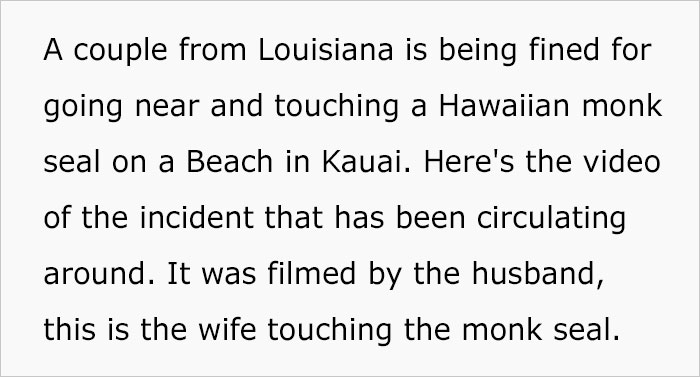
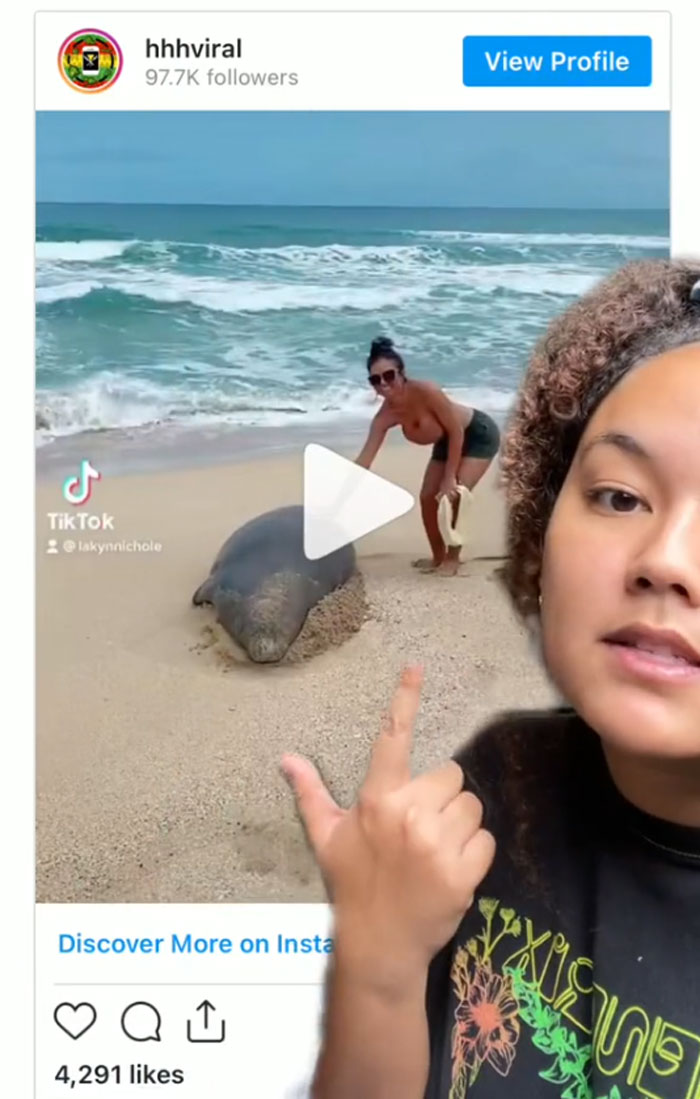
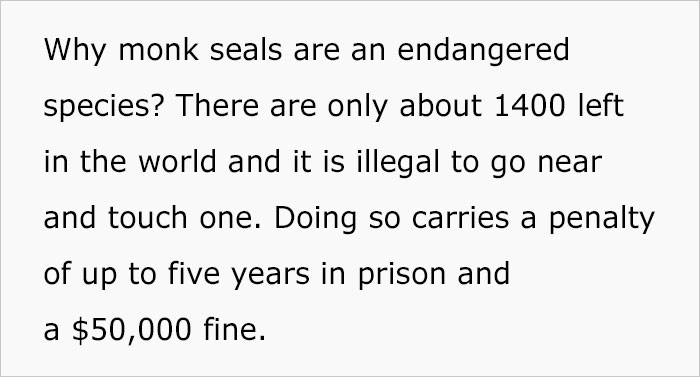
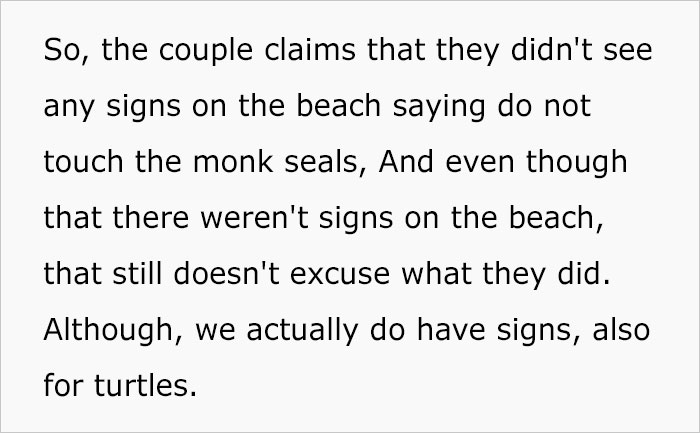
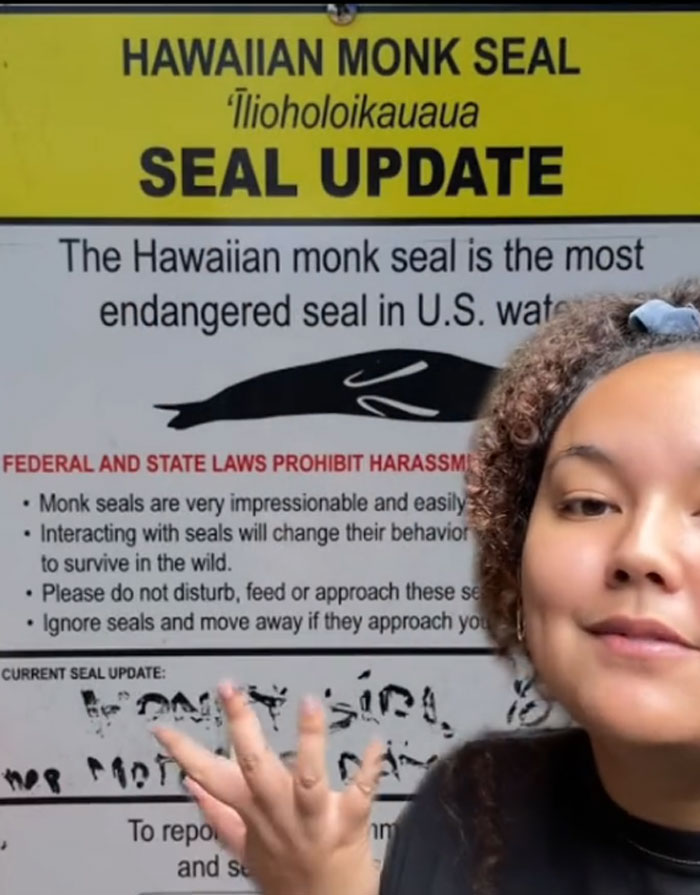
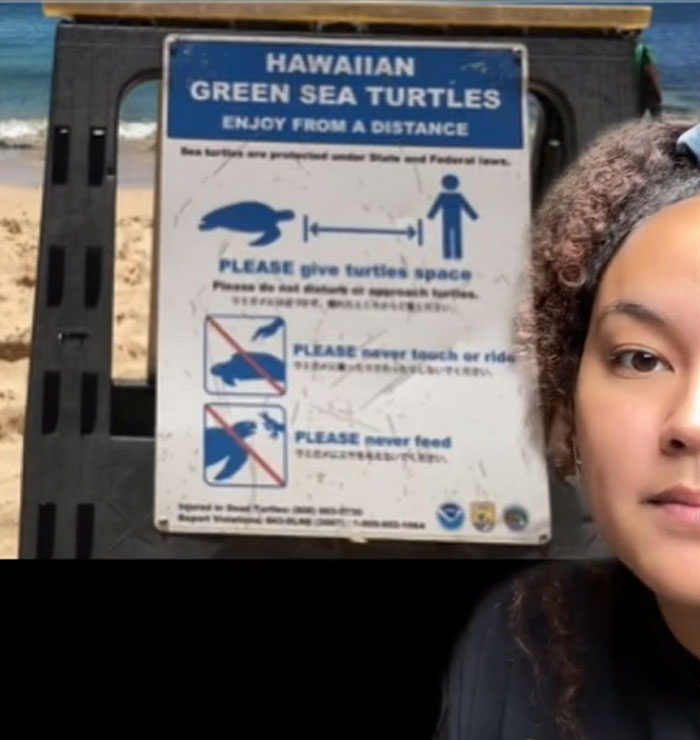
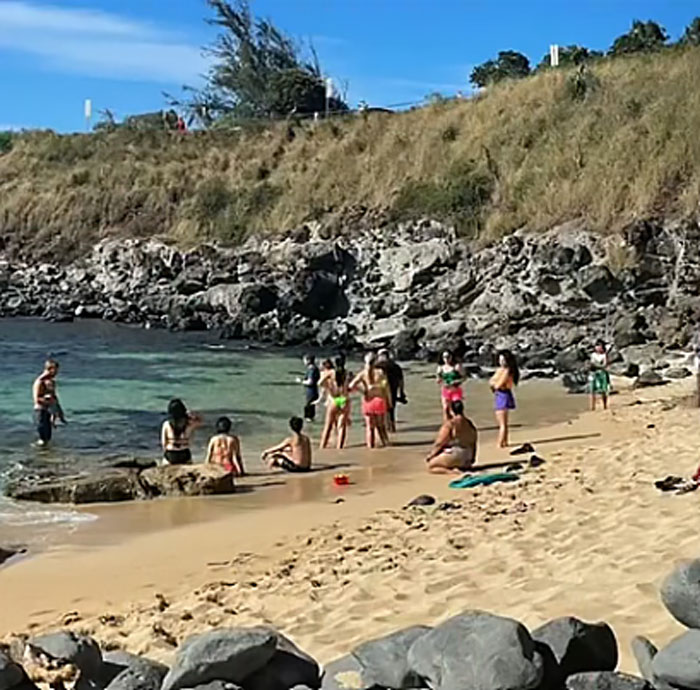
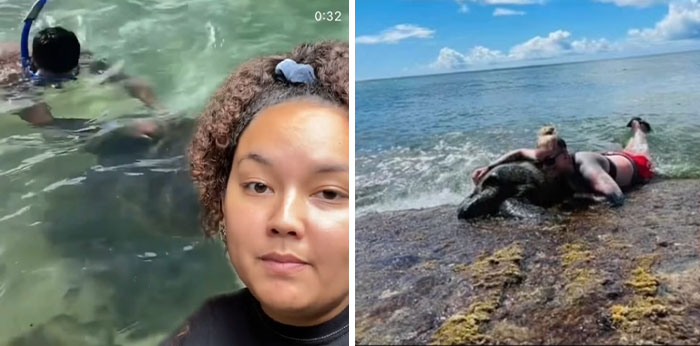
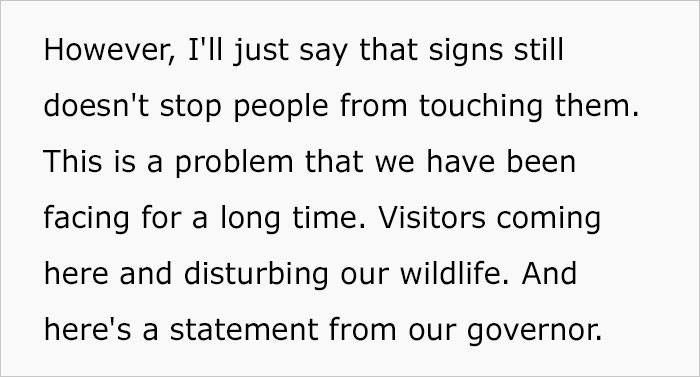
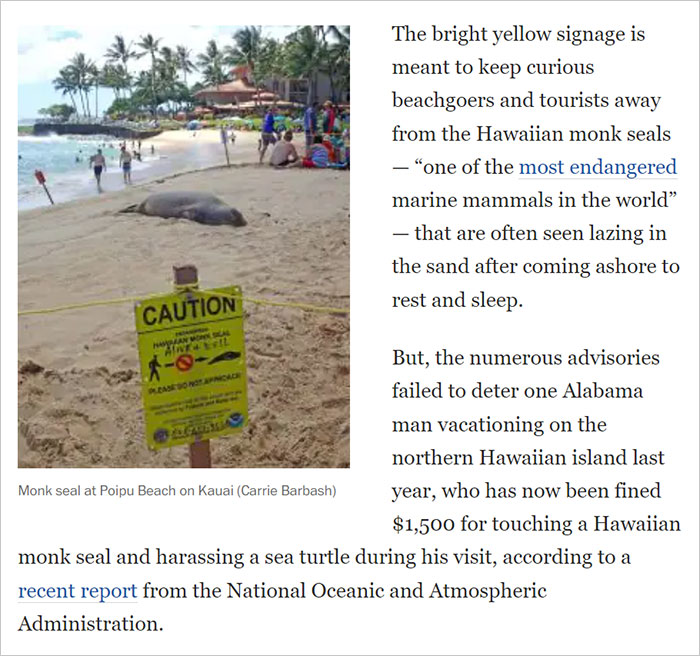

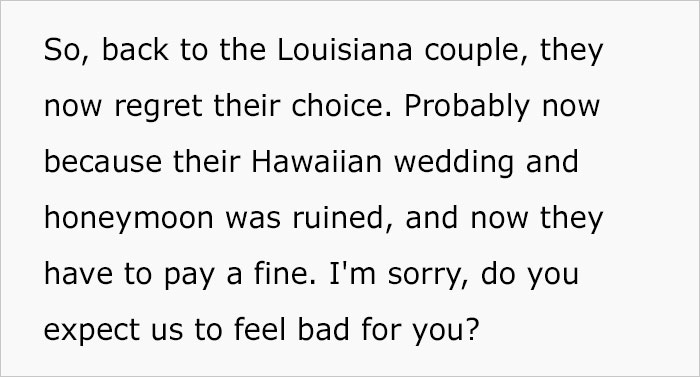
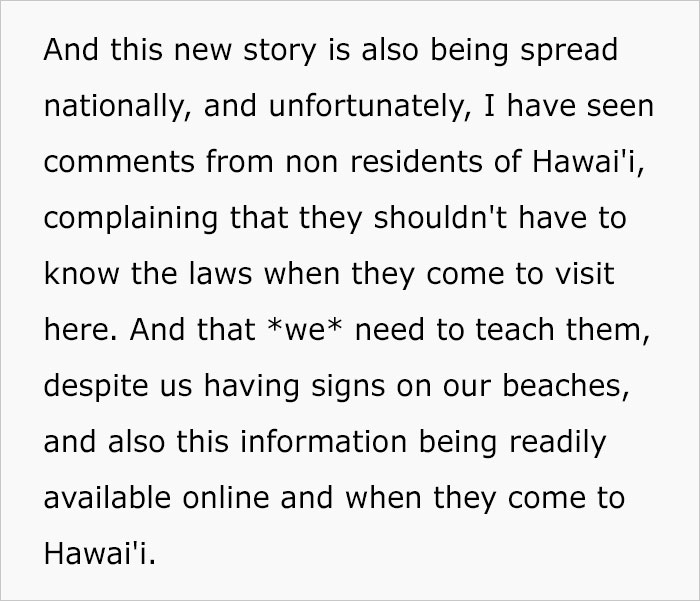
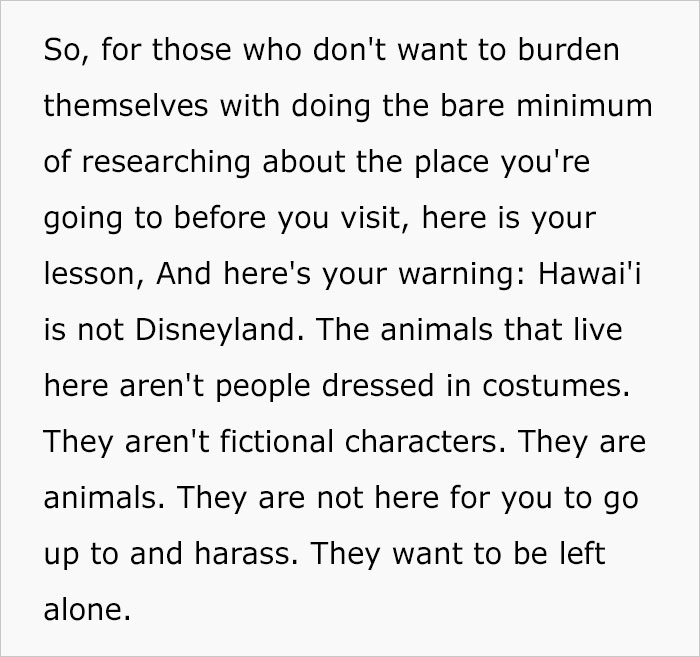
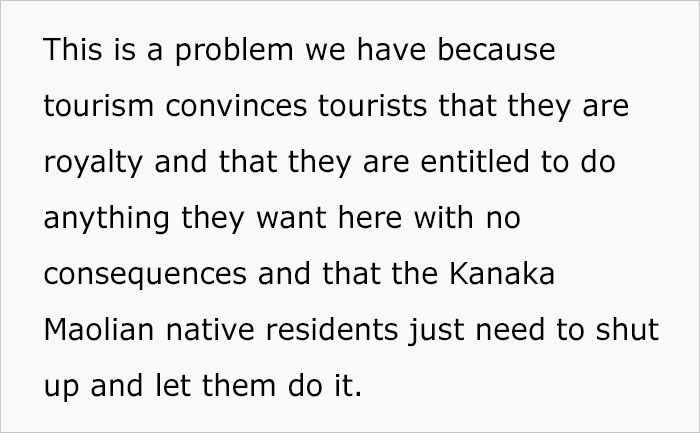
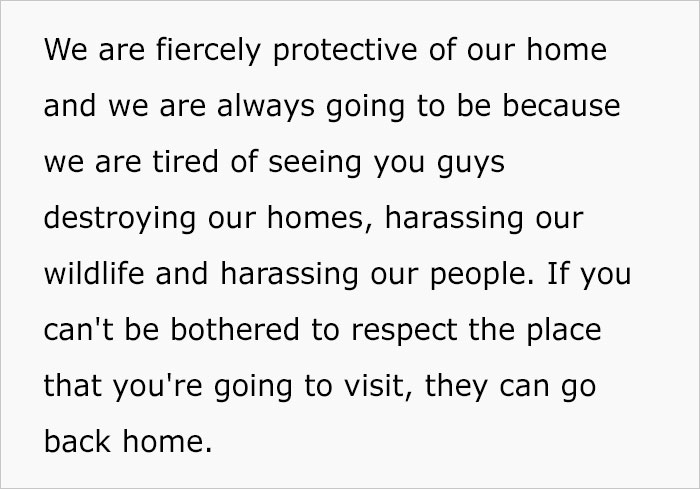




239
101